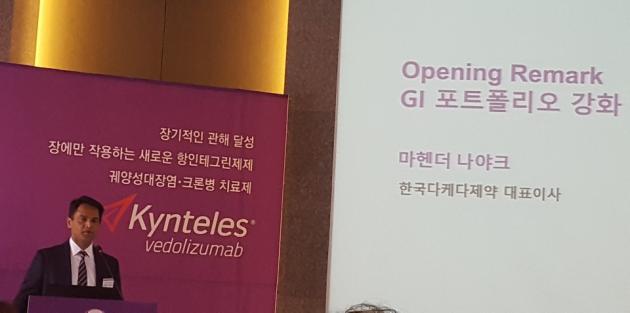Takeda Korea한국다케다제약 released its new drug Kynteles (compound: vedolizumab), the first integrin antagonist for the treatment of ulcerative colitis and Crohn’s disease, Thursday.
Kynteles is currently marketed in 45 countries. Its efficacy and integrated safety profile from six clinical trials have been built on more than 4,800 patient-years of exposure, while still receiving positive and promising feedback continuously from both patients and medical professionals.
Kynteles has received Korean reimbursement approval early this month for the treatment of adult patients with moderately to severely active ulcerative colitis (UC) or Crohn’s disease (CD) who have had an inadequate response with, lost response to, or were intolerant to a tumor necrosis factor-alpha (TNF-α) antagonist.
“Kynteles is a leading therapy in the field of gastroenterology and is a result of Takeda’s dedication to develop and deliver innovative medicines to patients,” said Mahender Nayak, president of Takeda Korea, during a media event at the Plaza Hotel in downtown Seoul. “We are proud to bring a treatment option like Kynteles to patients that currently have a safety profile of six clinical trials and around 2,830 patients.

Both UC and CD are chronic conditions that require life-long disease management, and therefore their treatments have to ensure long-term remission with a proven safety profile, he added.
Ulcerative colitis and Crohn’s disease are marked by inflammation in the digestive tract. UC impacts the large intestine only, which includes the colon and the rectum. The most common symptoms of UC include abdominal discomfort and blood or pus in diarrhea. CD can impact any part of the digestive tract, and common symptoms may include abdominal pain, diarrhea, rectal bleeding, weight loss, and fever.
There is no known cause for UC or CD, although many researchers believe that the interaction between genes, the body’s immune system, and environmental factors play a role.
Professor Jin Yoon-Tae진윤태 from the department of gastroenterology, Korea University Hospital, explained the benefits of Kynteles compared to the original anti-tumor necrosis factor (TNF) therapy.
“So far, we have had only limited medications that were used for patients who did not respond to steroids,” Professor Jin said. “Kynteles is expected to deliver clear safety benefits to patients who have failed in the treatment with anti-TNF therapy.”
Both UC and CD are a part of chronic intestinal bowel disease (IBD), and the symptoms are intractable while they worsen and are refractory. Although there are other therapeutic options available for UC and CD, there are still unmet medical needs.
“The risk of inflammation can increase in association with the systemic activity of anti TNF- therapy,” Professor Jin said.
“Inflammatory bowel disease refers to persistent intestinal inflammation due to constant moves of immune cells to the intestine,” said Park Eun-kyung박은경, director of the medical team in Takeda Korea. “As Kynteles is a gut-selective agent unlike other existing therapies, it has a less systemic impact and can prevent long-term intestinal inflammation associated with an additional inflow of inflammatory cells.”

